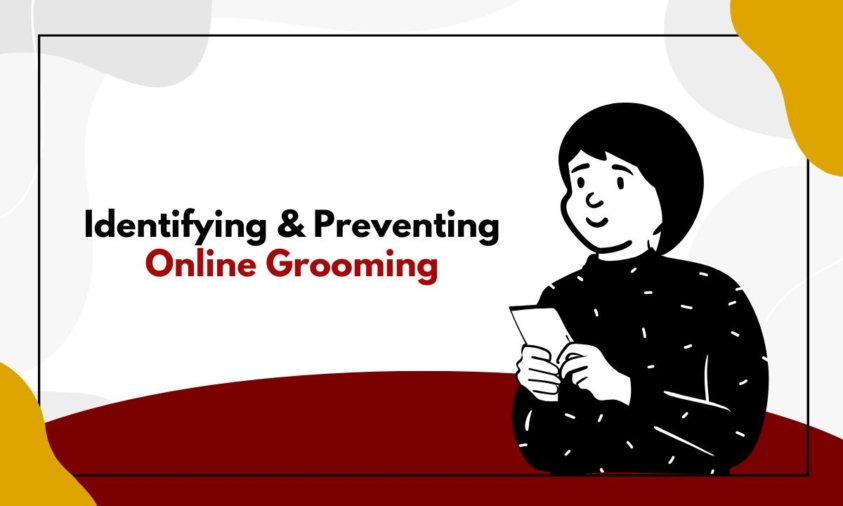In 2018, Dr. Rakshit Tandon, Cyber Security Expert, toured multiple schools in Delhi and Gurgaon, giving workshops to children on cyber security in the up and coming age of advanced technology. He stood in front of these school kids aged 11-18, and did the opposite of what was expected. A presentation or basic skills for internet use was expected, but horror stories and scare tactics was a unique and risky path that Dr. Tandon decided to follow. His stories of catfishing, robbery, scamming, rape and worse frightened every soul in that room, child or adult. Parents complained of trauma, teachers complained of gore, but the people who didn’t complain were the kids, the ones who had finally been exposed to the horrors of the unknown, in the end, making them safer online citizens.
This honesty could be vital in ensuring your child takes the correct precautions and increases their ability to recognise grooming. So, what exactly is online grooming?
The term “online grooming” refers to a broad range of strategies employed by abusers to sexually exploit children via the internet. At its foundation, it is a process, which can occur rapidly or gradually, of using fear and guilt to keep a child silent and using trust to change expectations of what constitutes safe behaviour.
Cyber groomers use a calculated strategy, employing a variety of techniques to win over a child’s trust, influence them and ultimately take advantage of them. These strategies consist of:
- Establishing Emotional Dependency and Trust
- Pretending to be a peer
- Presents and flattery
- Threats and Blackmail
- Isolating and creating division from family and friends
Research has shown that “stranger danger” on the internet is a worry, especially for younger children. The important thing to keep in mind is that the risks of exposing kids to online grooming can be reduced by giving them the appropriate guidance to help them make better decisions online. Utilising actions, such as the following, could help protect your child from online grooming:
- To keep personal information private: They should never give away personal information that could be used to identify them in the real world, such as their name, age, gender, phone number, home address, school name or photos without running it past YOU i.e., the parents.
- To determine who their ACTUAL friends are: Discuss with them the importance of exercising caution while sharing information online. Remind people they meet online may not be who they claim to be, even if they feel like friends.
- To report being uncomfortable: In certain games, such as Roblox, Among Us, Fortnite, Minecraft or any other games with a chat function, gamers intentionally attempt to scare other players. There may be cases of grooming, harassment, and harsh language in multiplayer games where players converse with one another. Therefore, it is critical that your child knows how to report abuse and confides in you if they are bothered by something.
Preventive Actions: What can one do to prevent online grooming?
- Privacy settings: Examine the privacy settings that can improve their online safety together. Assuming that default settings are public is always the wisest course of action, and they should be adjusted appropriately.
- Review apps, games and sites in use by your child: Although it’s likely that you will use social media yourself, you may want to find out about new ones your child is using or wishes to use. Create your own account and use them yourself to see what your youngster might view. While youngsters prepare for platforms like Instagram and Snapchat, they can also use a variety of kid-friendly social networks.
Investigating the kinds of online activities kids engage in is also crucial. Social media platforms video games, YouTube shorts, and live streaming all use various communication methods. To stay informed, have discussions about their use of digital devices
- Blocking software: Numerous new programs and applications are available that monitor, filter, and prevent online activity. Considering your child’s age, maturity, and privacy needs, you will need to determine as a family if this is the best course of action.
It is important to note that open communication is most vital in keeping your child safe online, and offline. It is necessary to create firm boundaries with your children, especially for pre-teens, it is alright to say no. However, once your child hits their teens, not having social media can lead to social alienation, hence open communication and being in constant touch is required between parents and kids.
As more kids and teenagers spend time online, cyber grooming is becoming a bigger concern. Groomers exploit and abuse young people by manipulating them using complex strategies. Parents, teachers, and the general public must exercise caution and put policies in place that shield kids from these predators. We can contribute to making the internet a safer place for children everywhere by being aware of the dangers and taking preventative actions.
Additional Resources
- Indian Cyber Squad: https://www.indiancybersquad.org/post/understanding-cyber-grooming-tactics-impact-and-global-cases-with-a-focus-on-india
- Cyber Delhi Police: www.cyber.delhipolice.gov.in
- Childline: https://www.childline.org.uk/info-advice/bullying-abuse-safety/online-mobile-safety/online-grooming/
- National Office for Child Safety: https://www.childsafety.gov.au/about-child-sexual-abuse/grooming
In case you are looking for customized child safety training, POCSO-related training, or POCSO advisory services, please feel free to reach out to us at +919004521614 or [email protected].
Authored by Tara Chanda, Content Writer Intern


 Cart is empty
Cart is empty 
